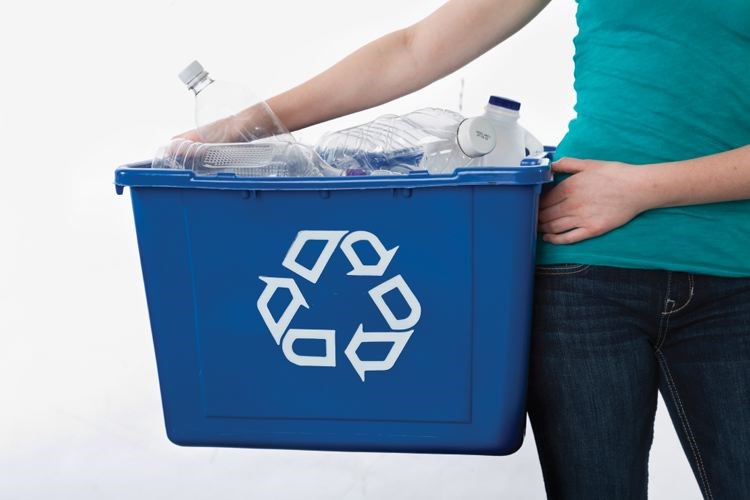It may make us feel virtuous to throw plastics into the blue bin. But the uncomfortable reality is that most aren't salvaged - whether they bear recycling symbols or not.
Instead, they end up scattered across the land and floating in our oceans, where creatures as small as plankton and as big as whales mistake them for food and eat or inhale them.
Among the recent victims: a camel found with 40 pounds of plastic lodged in its digestive system; a young sperm whale with 64 pounds of plastic in its stomach and intestines; and a baby dolphin that died because, as researchers found, it was poisoned by the plastic in its own mother's milk.
Now a marine biologist's video-gone-viral of the agonizing eight minutes it took to pull a plastic straw out of a sea turtle's bloody nostril is provoking a long-overdue discussion on the high price of "convenience" that comes with one-time-use plastics such as straws, coffee pods, bags, bottles and even ear swabs.
How bad is it? In the the mere 60 to 70 years that plastics have been in widespread use, 8.3 billion tonnes have been produced. Of that, scientists estimate 6.3 billion tonnes are still around as non bio-degradable litter. The oceans, in particular, are being choked by plastic rubbish; if current trends continue, plastics will outweigh fish by 2050.
And it's only going to get worse as countries that have traditionally accepted recycling waste, such as China, severely restrict its import.
If we're to save ourselves, and the other creatures we share the planet with, from drowning in plastic the first step is to say "no" to unnecessary one-time-use plastics. Instead, we should be using alternatives such as cloth bags, paper straws, reusable bottles and cotton swabs with paper or wooden stems.
Step two is to pressure businesses from manufacturers to retailers to use plastics that can be cleanly recycled or compostable products that can be used in their stead.
Black plastics used by grocery stores and restaurants to package take-out foods, for example, cannot be handled by Toronto's recycling system, despite symbols imprinted on the packaging that suggest they can. Surely distributors can replace them with plastics that can be recycled - or, better yet, with compostable containers.
Consider the battle brewing between Keurig Canada, manufacturer of single-serve coffee machines, and the city's recycling centre. In an effort seemingly aimed at the backlash against billions of its old "K-Cups" flooding landfills, Keurig introduced polypropylene pods that it advertises as recyclable in an effort to impress environmentally minded consumers. But Toronto says leftover grounds from the coffee pods contaminate other saleable recyclables, such as newspapers, so it has banned them.
Surely Keurig could invest in compostable, rather than plastic, pods. Alternatively, consumers can simply switch back to drip, pressed or perked coffee - as the man who invented K-Cups, John Sylvan, has done. "It's not like drip coffee is tough to make," notes Sylvan, who says he feels bad at the environmental havoc his creation has wrought.
Indeed, consumers are in the driver's seat when it comes to reducing unnecessary waste from plastics. They can pressure businesses to ditch their addiction to over-packaging by choosing fruits and vegetables, for example, that are not wrapped as if they are Faberge eggs.
Happily, some small businesses and big corporations alike are already responding to customers' concerns.
In Prince George, several local restaurants - Nancy O's, Betulla Burning, Cimo Mediterranean Grill, Kask, CrossRoads Brewing, White Spot and Moxies, are phasing out plastic straws or offering them only upon request.
Further afield, McDonald's has gone one step further by announcing it will switch to paper straws in all its 1,300 British locations starting in May, while some large supermarket chains in that country already stock only paper ones.
Straws may seem like small potatoes in the flood of the almost 32 million tonnes of plastic produced around the world each year. But they are as good as any place to start. The ubiquitous utensils actually make up about four per cent of plastic trash by piece and scientists estimate there could be as many as 8.3 billion of them littering the world's coastlines.
Governments, too, are responding to pressure, and education. During the recent Commonwealth leaders' summit British Prime Minister Theresa May announced she plans to ban plastic straws and some other single-use products.
Prime Minister Justin Trudeau stopped short of doing that, for now. But last week his government announced a public consultation to develop a national strategy aimed at reducing the amount of plastics Canadians consume and toss out. That's long overdue.
It's time we recognized the true cost of "convenience" - for the sake of all living creatures, including ourselves. After all, we eat the fish that eat the plankton that eat the plastic. It's a deadly cycle that only we can stop.
-- Toronto Star with files from
Prince George Citizen



